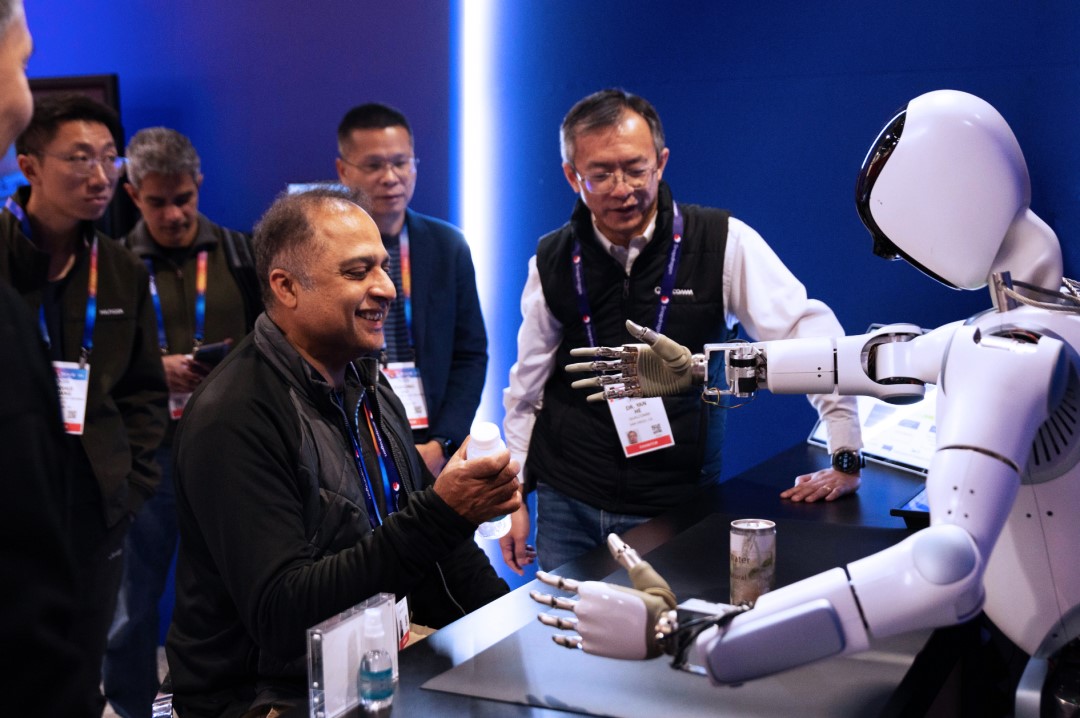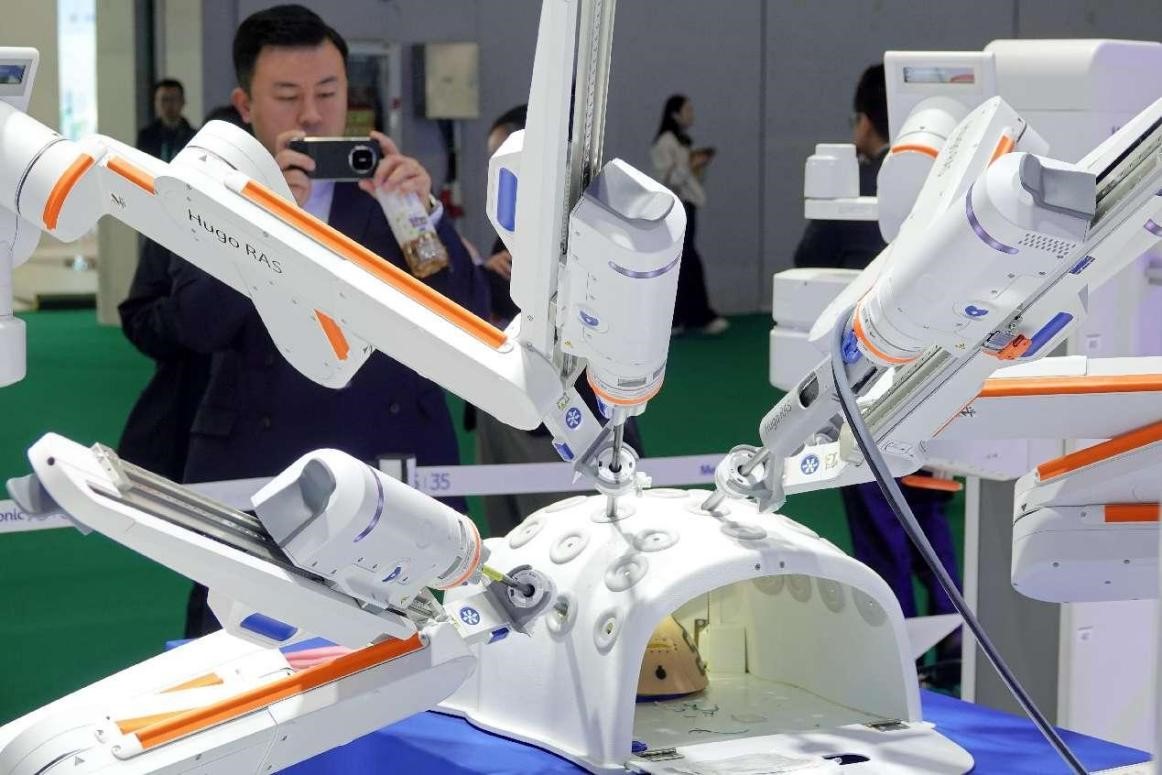To define China-U.S. relations by mutual benefit, win-win cooperation
Over the past few years, China-U.S. relations have gone through ups and downs, but one thing remains unchanged: only through cooperation can the two countries achieve mutual benefit and win-win outcomes.
The 2025 Consumer Electronics Show recently concluded in the U.S. city of Las Vegas once again demonstrated how Chinese and American interests are deeply intertwined, and proved that the two countries can benefit from win-win cooperation.
It is reported that over 1,300 Chinese companies participated in the event, accounting for about 27 percent of all exhibitors.

During the 2025 Consumer Electronics Show held in the U.S. city of Las Vegas, Ultra Magnus, the first humanoid robot prototype jointly unveiled by Chinese artificial intelligence company APLUX and U.S. tech giant Qualcomm, captured substantial attention. (Photo from the official account of APLUX on WeChat)
The latest cooperation achievements between Chinese and American tech companies garnered substantial attention. For example, Chinese artificial intelligence company APLUX and U.S. tech giant Qualcomm jointly unveiled Ultra Magnus, the first humanoid robot prototype. The robot can communicate freely and naturally with visitors and serve them beverages, demonstrating efficient service capabilities.
During the event, Chinese and American companies engaged in face-to-face exchanges across multiple consumer technology sectors, including artificial intelligence glasses, health wearable devices, new energy vehicles, and smart homes. The two countries boast immense potential for cooperation, which will benefit the two peoples.
Under the current circumstances, common interests between China and the U.S. are expanding rather than shrinking. This is a sentiment shared by the vast majority of businesses and people from both sides, and serves as an important foundation for the two countries to work in the same direction for mutually beneficial cooperation.
Looking back at 2024, China hosted over 3,800 economic and trade events. American companies had the largest exhibition area at the seventh China International Import Expo, and took the largest share of overseas participation at the second China International Supply Chain Expo. Many U.S. corporate executives frequently visited China. These China-U.S. business exchanges have opened up opportunities and fostered mutual success.
The cooperation between Chinese and American enterprises demonstrates that as long as the two countries stay committed to mutual respect, mutual benefit, and equal-footed consultation, follow economic and market rules, and expand and deepen mutually beneficial business cooperation, they can achieve win-win outcomes.
In the past 46 years since the establishment of diplomatic relations between China and the U.S., the international situation and the bilateral relationship have gone through tremendous changes. However, a comprehensive examination of China-U.S. relations reveals a wide range of common interests shared by the two sides, with mutual benefit and win-win cooperation being the essential characteristics of bilateral relations.
This is sufficient to enlighten both sides that they should be partners rather than rivals; help each other succeed rather than hurt each other; and seek common ground and reserve differences rather than engage in vicious competition.
China has proposed that both countries should uphold the principles of mutual respect, peaceful coexistence and win-win cooperation, and find the right way to get along in the new era. This is both a profound summary of past experience and a crucial guide for the future.
Chinese ancestors once said, "Parties involved in trade can have their needs met and obtain more benefits." At the entrance of the Commerce Research Library of the U.S. Department of Commerce, there is an inscription that reads: Cultivate peace and commerce with all. This means that mutual benefit and reciprocity holds true in both ancient times and today, and is a shared belief in both Chinese and American businesses.
In 2024, Tesla's electric vehicle sales in the Chinese mainland hit a record high of 657,000 units, up 8.8 percent year on year. Starbucks added 290 new stores to its footprint on the Chinese mainland in the fourth quarter of 2024, entering 78 new county-level markets.

The Hugo robotic-assisted surgery system developed by medical tech company Medtronic is exhibited at the seventh China International Import Expo (CIIE) in east China's Shanghai, Nov. 8, 2024. (People's Daily Online/Tang Ke)
More than 73,000 American companies have established businesses in China by 2024, with the total investment exceeding $1.2 trillion, covering sectors such as electronics and communications, automobile manufacturing, consumer goods, and financial services.
Countless examples show that American businesses investing and doing business in China not only yield profits but also benefit the people of both countries. As China is advancing Chinese modernization and the U.S. is revitalizing its economy, there is plenty of room for their cooperation.
The interests of China and the U.S. are closely intertwined. Naturally, the two countries have divergences and disagreements between them. Yet these should not become obstacles to their bilateral cooperation.
Faced with the recent years' new and evolving situation in China-U.S. business ties, the two sides should stay committed to mutual respect, seek common ground while shelving differences, and take constructive measures to enhance understanding and expand consensus.
Tariff wars, trade wars, and tech wars are against the trend of history and laws of economics. They will only disrupt normal trade exchanges and the stability of global industrial and supply chains, which does not serve the interests of any party.
Gary Shapiro, CEO of the U.S. Consumer Technology Association (CTA), warned that the tech sector is America's economic engine, but proposed tariffs threaten the deflationary power of tech in the global economy. According to a report released by CTA, President-elect Donald Trump's tariff proposals on technology products could lead to $90 billion-$143 billion decline in U.S. consumer purchasing power in 2025.
Maurice Obstfeld, former chief economist of the International Monetary Fund, recently observed that using tariffs to increase U.S. power in the global economy will likely backfire and damage the U.S. economy.
It is never too late to do the right things. At the critical crossroads in the development of China-U.S. relations and the key moment of world economic recovery, it is especially important to define China-U.S. relations by mutual benefit and win-win cooperation, and to take actions responsible for both countries and the world.
Looking ahead, China and the U.S. can help each other succeed and prosper together through cooperation. Together, they can accomplish great things that benefit both countries and the world.
(Zhong Sheng is a pen name often used by People's Daily to express its views on foreign policy and international affairs.)
Photos
Related Stories
- China to take actions to safeguard interests against U.S. AI restrictions: spokesperson
- China adds 7 U.S. companies to unreliable entity list
- Chinese RedNote tops US app store as American users worry about potential TikTok ban
- Chinese Embassy in U.S. hosts Spring Festival gala for Chinese, American youths
- China firmly opposes U.S. restrictions on AI exports: ministry
Copyright © 2025 People's Daily Online. All Rights Reserved.









